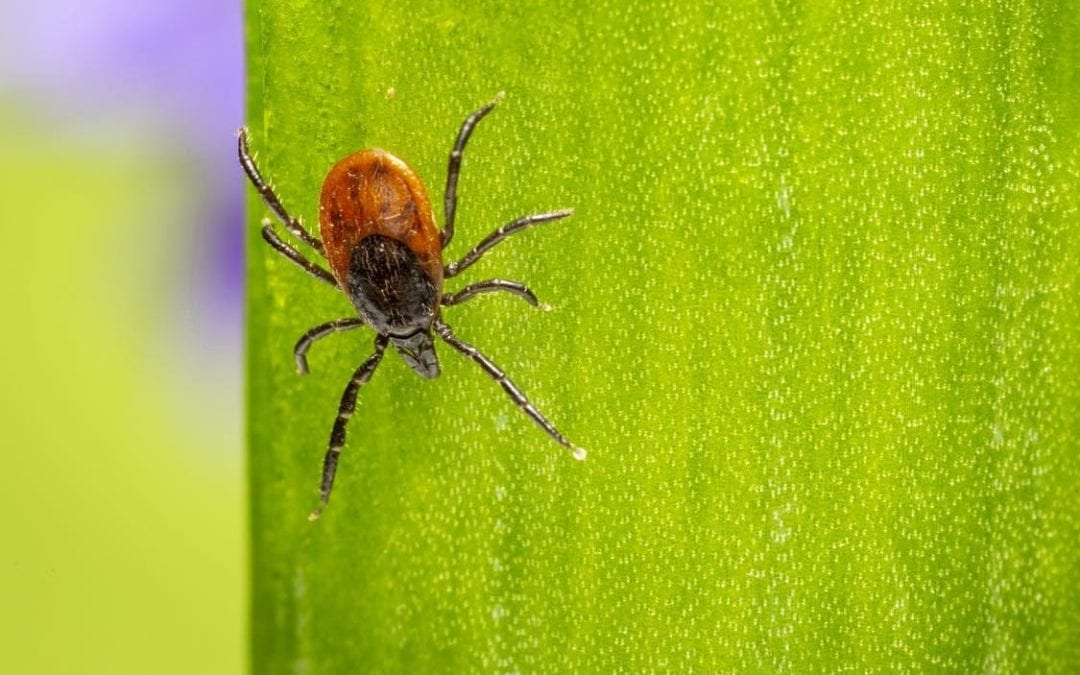Ticks are active all year round, but come out in numbers in late spring in early summer. More than a nuisance, these pinhead-sized insects can spread life-threatening infections through their bites. So, as we enter into warmer months, make sure you know the ins and outs of tick bite prevention.
Here are the top tips for preventing tick bites, as suggested by our pest control experts.
Steer Clear of Ticks’ Territory
The first and easiest thing to remember for preventing tick bites is to avoid the areas where these tiny biters are most likely to be found. Luckily for us, ticks cannot jump great distances or fly. However, ticks latch on to unsuspecting passersby when they are sufficiently close. These tiny insects easily attach to your skin, clothing, and your pet’s fur when you come into contact with them. Ticks select these places to hide because their victims are likely to pass by or brush up against. This is why they usually live in tall weeds, shrubs, grassy and woody areas, and leaf litter.
Therefore, whether you go out hiking, hunting, or simply strolling in your backyard, make sure to steer clear of all possible tick territories. Stay in the center of the path, avoiding the grassy areas and leaf litter. Keep your picnics as safe as possible by sitting on lawns that have short grass and no long weeds. Pick spots that have abundant sunshine as any potential hazards will be easily visible.
Protect Yourself with Permethrin
Permethrin is a topical medicine used to treat scabies and lies. However, it is more popular for its effectiveness as an insecticide. Look for insect-repellants containing at least 0.5% permethrin. They are commonly available at most home and drug stores. You can use permethrin creams or lotion. If there’s an issue with skin sensitivity, you can go for permethrin sprays instead.
In fact, the Centers for Disease Control (CDC) recommends treating all clothing and wearable outdoor gear with 0.5% permethrin solution. The effects of permethrin spray typically last through several washings. So, you and your kids will stay protected for longer. If frequently visiting tick-infected areas is a necessity, consider purchasing permethrin-treated clothes that are treated professionally. The clothes can provide protection for up to seventy washings.
Wear EPA-Registered Insect Repellants
If you cannot find or use permethrin-based products, don’t just grab any repellant as a substitute. Ticks are peculiar pests and, as such, require specials chemicals to keep them at bay.
Make sure whatever repellant you buy is approved by the Environment Protection Agency (EPA). Repellants containing at least 20% DEET, IR3535, or picaridin are usually the most effective against ticks. In addition to these, repellants containing 2-undecanone or para-menthane-diol (PMD) are an excellent choice as well. Always remember to follow the instructions on the label and reapply as directed.
Choose Proper Clothing
As mentioned earlier, Maine outdoor areas are a habitat for ticks. One of the best things you can do to stay safe from these blood-sucking insects is to dress properly when heading out. The clothing you choose is a significant way of defense for you and your family.
Wear light-colored clothing so that the ticks will be easily visible on them and hence could be quickly removed.
Dress up in long pants so that your legs are covered properly, and even tuck your pants inside the socks. Putting tape on the area where the socks and pants meet will provide additional protection against dangerous tick bites. Just like wearing long pants helps against these insects, long sleeves are the best choice to protect your arms. For optimum protection, the sleeves should be a little fitted towards the wrists. Wearing slippers and sandals will never be a good choice when it comes to avoiding ticks outdoors. Instead, you should always wear boots or hiking shoes. Similarly, wear hats and caps to prevent ticks from latching onto your head and hair.
Perform a Tick Scan
Even for houses that are not built near woods, ticks are still a concern because they are present in fallen leaves that are not raked away frequently. The same goes for overgrown grassy lawns and unpruned gardens. This is why it’s essential to maintain your yard.
Since pets love to play outdoors and in the backyards/front yards, ticks often use them as carriers to get their way into homes, and more precisely, to more victims. Therefore, when returning from your outdoor excursion, remember to thoroughly check yourself, your pet, and all outdoor gear for ticks. Pay close attention to the areas around the waist, behind the ears, under the arms, and on the back of knees.
If you frequently find ticks on your property, contact our pest control professionals right away. We can help you implement the best preventive plan so you can enjoy beautiful summer days without worrying about these blood-suckers.
